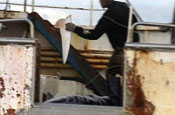US acts to cut Atlantic shark quotas and prohibit removal of shark fins at sea
New rules improve outlook for Atlantic sharks and serve as a model for Europe

The Shark Alliance is heralding new rules for shark fishing in the United States (US) Atlantic and drawing parallels to needed improvements in European Union (EU) shark fishing regulations. Changes to the US Atlantic shark plan, announced by the government today, will vastly improve the region's ban on shark finning (cutting off a shark's fins and discarding the body at sea) by prohibiting the removal of shark fins at sea, a strategy aimed at better enforcement and species-specific data collection. The government will also dramatically reduce fishing quotas for some of the region's most imperiled shark species, such as porbeagles, in line with scientific advice. Changes take effect July 24.
"We applaud the US for improving the Atlantic shark finning ban by requiring that sharks be landed with their fins attached, as long recommended by enforcement officials and scientists," said Sonja Fordham, Policy Director for Shark Alliance and Shark Conservation Program Director for member group Ocean Conservancy."This straight-forward strategy is by far the best method for ensuring an end to the wasteful practice of finning and should serve as a model for the EU as it works to improve its finning ban through the development of a Community Plan of Action for Sharks."
The new US rules will cut fishing for depleted sandbar sharks, the region’s most commercially valuable species, to a strictly limited, research fishery. Since the passage of the first Atlantic shark plan in 1993, scientists have advised quota reductions for this and other overfished, coastal shark species, but lawsuits from the fishing industry had prevented full implementation of scientific advice. Conservationists are hopeful that new coastal shark quota cutbacks will be sufficient to begin population recovery which, for some species, is expected to take many decades.
The US will also cut its quota for the more oceanic porbeagle shark from 92 to 11 metric tons (t). The Northwest Atlantic porbeagle population has been deemed "Endangered" by IUCN is estimated to need 100 years to recover from overfishing. This same species is even more depleted off Europe, where it is still targeted and overall EU quotas amount to more than 500t. EU scientists have called for an end to fishing porbeagles off Europe.
"We welcome the new US rules as a solid step toward effective shark conservation in the Atlantic and stronger finning bans around the world," added Fordham. "The EU should learn from the US experience: that mismanagement of sharks takes decades to repair and that the "fins-attached" policy is a feasible and reliable strategy whose time has come."






